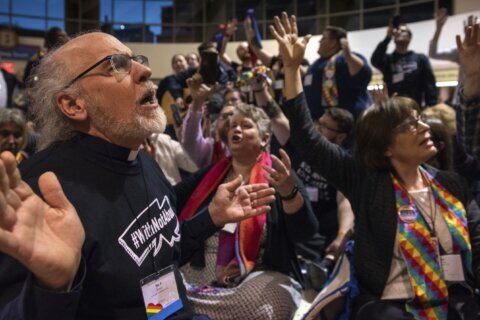LONDON (AP) — British companies will face fines unless they meet new government requirements showing their supply chains are free from forced labor, the U.K.’s foreign secretary said Tuesday as he announced measures aimed at tackling human rights abuses against the Uighur minority in China’s Xinjiang region.
Foreign Secretary Dominic Raab said officials have issued guidance to British firms with links to Xinjiang on how to carry out due diligence checks. The government intends to exclude suppliers when there is evidence of rights violations in their supply chains and also to review export controls to prevent the shipping of any goods that could contribute to such violations in Xinjiang.
“Our aim, put simply, is that no company that profits from forced labor in Xinjiang can do business in the U.K., and that no U.K. business is involved in their supply chains,” Raab told lawmakers.
However, Raab didn’t provide details, and he stopped short of announcing specific sanctions against Chinese officials, saying that the U.K. government continues to sanctions over human rights violations under review.
Beijing has been accused of widespread rights abuses in its far western Xinjiang region, mainly targeting the Muslim Uighur population. Raab said mounting evidence, including first-hand testimony and non-profit reports, supports claims of unlawful mass detention in internment camps, widespread forced labor and forced sterilization of women on an “industrial scale.”
The evidence “paints a harrowing picture” and showed the practice of “barbarism we had hoped lost to another era,” Raab said.
Britain’s Foreign Office minister of state, James Cleverly, followed up at a U.N. Security Council meeting on combatting terrorism, pointing to China’s “severe and disproportionate measures” against the Uighurs as an example of counter-terrorism measures being used “to justify egregious human rights violations and oppression.”
He said Beijing’s detention of up to 1.8 million people in Xinjiang without trial and other well-documented measures run counter to China’s obligations under international human rights law and counter to the Security Council’s requirement that counter-terrorism measures comply with those obligations.
China’s U.N. ambassador, Zhang Jun, rejected what he termed Cleverly’s “groundless attacks,” saying that “the various narratives on Xinjiang are purely politically motivated” and have no basis in the facts.
“As a victim of terrorism, China has taken resolute measures to firmly fight terrorism and extremism,” he said. “Our action is reasonable, is based on law, and conforms to the prevailing practice of countries of the region.” At the same time, he said, China has safeguarded the rights of ethnic minorities.
Chinese officials have denied the accusations and said some of the claims were fake news or lies perpetrated by Western media. They also say measures were needed to deradicalize the population after a series of attacks in the Xinjiang region several years ago.
The U.S. customs agency blocked imports of clothing and other goods from Xinjiang last year over the forced labor issue.
The foreign affairs spokesperson, for Britain’s opposition Labour Party, Lisa Nandy, said the strength of Raab’s words did not match his actions.
“I’m sorry to say that that will be noticed loud and clear in Beijing,” she said.
Copyright © 2024 The Associated Press. All rights reserved. This material may not be published, broadcast, written or redistributed.







